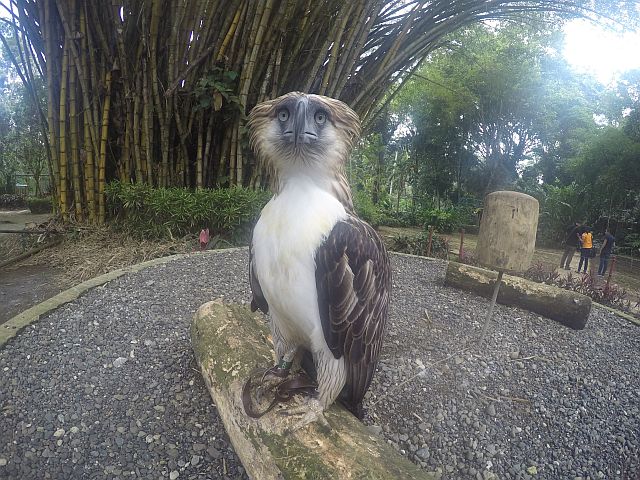
A photo of 13-year-old Mindanao, the newly adopted eagle of Cebu Pacific. (CDN PHOTO APPLE MAE TA-AS)
Eagles by nature are solitary and fiercely territorial.
But 13-year-old captive Philippine eagle Mindanao is quite sociable and is not bothered by visitors to the Philippine Eagle Foundation (PEF) plaza in barangay Malagos, Davao City.
His friendly demeanor earned him the title of Philippine ambassador to education.
Mindanao is not being kept in a cage, but is being kept on a leash to keep him away from the visitors.
He would look from left to right and occasionally stretch his seven-foot wings.
Visitors posing for photos with Mindanao are advised to observe the three-meter distance from the eagle and turn off the camera flash.
Breeding program
Mindanao was adopted by low-cost carrier Cebu Pacific Air last Oct. 15.
The adoption program, which runs for a maximum of five years, will cost P125,000 to P150,000 a year to cover food, veterinary care and maintenance of the chosen eagle. Part of the fund will also go to PEF’s other programs.
The airline committed to raise awareness on the plight of Philippine eagles, now considered critically endangered due to indiscriminate hunting.
“First, we want to help PEF and we believe in their advocacy in the conservation of eagles. Second, we really want to encourage people to join in the discussion to make them aware of (the eagles’) extinction,” said Apple Ignacio, Cebu Pacific’s director for products.
Mindanao has been in PEF’s captive breeding program for 13 years.
The program re-introduces raptors to their natural habitat in an effort to keep their dwindling population in the wild.
Dwindling
PEF executive director Dennis Salvador said the program was initiated to augment the population of Philippine eagles.
“They are diminishing at a very accelerated rate. We need to recapture them to augment the dwindling population,” he said.
PEF hatched 25 eaglets and it has more than 30 eagles under its care. The eagles were caught in the wild starting 1992.
All the eagles are supposed to be released into the wild after two to three years.
But Mindanao has been kept and will stay inside the park. Salvador said the 13-year-old eagle was born at a time when the foundation was still learning the process of imprinting and training eagles.
Endangered
He said Mindanao has been used to the presence of humans, who may harm him once he is set free into the wild.
As per record, there are only 400 pairs of Philippine eagles left in the country.
Deforestation has reduced their natural habitat and indiscriminate hunting activities have resulted in their deaths.
The latest victim was three-year-old Pamana, who was found shot in Davao City. She was released at the foot of Mt. Hamiguitan, a UNESCO World Heritage Site, in San Isidro, Davao Oriental last June 12.
The Philippine eagle is protected under Republic Act No. 9147, or the Wildlife Conservation and Protection Act.
The law imposes a jail sentence of six to 12 years or a fine of between P100,000 and P1 million for the killing of critically endangered species.
Salvador said despite Panama’s death, they will continue releasing Philippine eagles into the wild because it is where they belong.
Ignacio said Mindanao’s adoption is part of Cebu Pacific’s long-term commitment to the environment.
Their other program is the Bright Skies for Every Juan Campaign in partnership with World Wide Fund for Nature-Philippines which helps improve the Tubbataha and Apo Reefs in the country.
Disclaimer: The comments uploaded on this site do not necessarily represent or reflect the views of management and owner of Cebudailynews. We reserve the right to exclude comments that we deem to be inconsistent with our editorial standards.
